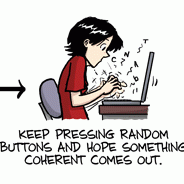-
Posts
527 -
Joined
-
Last visited
-
Days Won
1
Reputation Activity
-
 hj2012 got a reaction from metaphysicaldog in 2018 Applicants
hj2012 got a reaction from metaphysicaldog in 2018 Applicants
Non-fiction programs - especially full-residency programs with stipends - are absolutely not receiving fewer applications than PhD programs. Wisconsin-Madison's numbers are not outliers. Creative nonfiction programs are extremely competitive, as the opportunity to have 3 years to work on a book project is very compelling even to professional journalists, editors, and writers. For example, I have a friend who recently transitioned from a full-time job as an investigative reporter to an MFA program with far less prestige than the Iowa Writer's Workshop. She has years of experience, an excellent portfolio, and is represented by a great agency in NYC. This is your competition. Therefore, MFA non-fiction programs are a poor "back-up" choice to the PhD. In fact, considering the competitiveness of fully funded MFAs, you might want to conceive of it as the other way around!
Beyond admissions statistics, however, it might behoove you to think carefully about what your overall aims are, as @Warelin also suggested. Grad school is a means to an end, and my concern is that you seem to want to enter graduate school for the sake of it, which is not the best plan of action. If you want to be a literary scholar, commit to PhD programs, even if it means multiple application seasons (which, by the way, is not rare!). If you ultimately dream about being a nonfiction writer, commit to improving your craft and your CV, and ditch the PhD apps - they won't help you get there.
-
 hj2012 got a reaction from guest56436 in 2018 Applicants
hj2012 got a reaction from guest56436 in 2018 Applicants
Non-fiction programs - especially full-residency programs with stipends - are absolutely not receiving fewer applications than PhD programs. Wisconsin-Madison's numbers are not outliers. Creative nonfiction programs are extremely competitive, as the opportunity to have 3 years to work on a book project is very compelling even to professional journalists, editors, and writers. For example, I have a friend who recently transitioned from a full-time job as an investigative reporter to an MFA program with far less prestige than the Iowa Writer's Workshop. She has years of experience, an excellent portfolio, and is represented by a great agency in NYC. This is your competition. Therefore, MFA non-fiction programs are a poor "back-up" choice to the PhD. In fact, considering the competitiveness of fully funded MFAs, you might want to conceive of it as the other way around!
Beyond admissions statistics, however, it might behoove you to think carefully about what your overall aims are, as @Warelin also suggested. Grad school is a means to an end, and my concern is that you seem to want to enter graduate school for the sake of it, which is not the best plan of action. If you want to be a literary scholar, commit to PhD programs, even if it means multiple application seasons (which, by the way, is not rare!). If you ultimately dream about being a nonfiction writer, commit to improving your craft and your CV, and ditch the PhD apps - they won't help you get there.
-
 hj2012 reacted to Trystero0 in Submitting a multimedia essay
hj2012 reacted to Trystero0 in Submitting a multimedia essay
Hi again, everyone – thanks for the insightful advice. I had a hunch that the whole process would be too cumbersome for most admissions committees, so it's nice to see you all corroborating my suspicions before it was too late. I'll probably paraphrase content from the film in a way not unlike that of Žižek, or perhaps submit an essay more entrenched in standard textual analysis and close-reading. Anyways, I appreciate the responses!
-
 hj2012 got a reaction from Trystero0 in Submitting a multimedia essay
hj2012 got a reaction from Trystero0 in Submitting a multimedia essay
At least for most interdisciplinary programs (American studies, cultural studies, etc) and English depts, I wouldn't bother with the multimedia essay unless you have an explicit invitation to do so. My advice would be to provide relevant stills for close analysis and enough textual contextualization so that the reader can follow along. Briefly describing the film is probably a good idea. Scholars of Joyce can assume that their audience has read Ulysses. The same can't be said for your subject material. In any case, the ability to succinctly summarize a cultural text while drawing out the features cogent to your analysis is a good skill to showcase, especially if you plan on studying a "less canonical" body of work.
Just my $.02.
-
 hj2012 got a reaction from Dr. Old Bill in Submitting a multimedia essay
hj2012 got a reaction from Dr. Old Bill in Submitting a multimedia essay
At least for most interdisciplinary programs (American studies, cultural studies, etc) and English depts, I wouldn't bother with the multimedia essay unless you have an explicit invitation to do so. My advice would be to provide relevant stills for close analysis and enough textual contextualization so that the reader can follow along. Briefly describing the film is probably a good idea. Scholars of Joyce can assume that their audience has read Ulysses. The same can't be said for your subject material. In any case, the ability to succinctly summarize a cultural text while drawing out the features cogent to your analysis is a good skill to showcase, especially if you plan on studying a "less canonical" body of work.
Just my $.02.
-
 hj2012 got a reaction from Daenerys in Speaking of Languages: Sign Language?
hj2012 got a reaction from Daenerys in Speaking of Languages: Sign Language?
Is literature confined to written text? There's also an argument for a more capacious definition of "literature" as such that might include, for example, the vibrant world of ASL literature. The inclusion of ASL literature raises fascinating and urgent questions about epistemological categories, performance and embodiment, technology and translation -- debates that continue to enrich literary and cultural studies, in my opinion.
-
 hj2012 got a reaction from Daenerys in Speaking of Languages: Sign Language?
hj2012 got a reaction from Daenerys in Speaking of Languages: Sign Language?
Sure, but OP says their research area is disability studies, for which ASL is absolutely useful. From the experiences I've heard from folks working on deaf cultures or disability studies who struggled to get ASL accepted for a language requirement, it seems that part of the reason why departments don't see ASL as a viable research tool is precisely because they don't really think of it as a language.
-
 hj2012 reacted to fuzzylogician in Separating the wheat from the chaff in academia
hj2012 reacted to fuzzylogician in Separating the wheat from the chaff in academia
Well. I'll ignore the "maybe linguistics and history aren't as rigorous as the science I am studying" bit and other not so subtle jabs at me. I'll also not spend time writing a long post about presentation skills and their usefulness in areas outside academia. I'll say this: if you've had this problem for over a decade, then this is something you could and should have planned for. I assume this exam isn't some secret they only let you in on after you've joined your program -- it's probably on the department's webpage and you could have known about it. The fact that you didn't plan for it is not anyone else's fault. Now the question is what you are going to do about it. If the entire point of this thread is to blow off steam, you're doing a good job. But if you want to actually get advice, that means being open to opinions other than your own. So here's mine: have you had a conversation with your committee about alternative ways of satisfying the requirement? Have you had a chat with the office of disabilities? Have you taken any action at all to try to fix the situation? There very well might be people who want to help you, but you need to ask for help, and you need to make a good faith effort to find alternatives, if you want to be able to move forward. You might also want to refrain from assuming you can know what experiences people have had, where they come from, or what they can relate to, if you know nothing about them.
-
 hj2012 reacted to Tektonic in Separating the wheat from the chaff in academia
hj2012 reacted to Tektonic in Separating the wheat from the chaff in academia
Well, "stage fright" and even "serious stage fright" do not adequately define this. Not that the things you describe aren't important, but they're mostly applicable to academics, which I do not want to stay in. And, the consequences of not being great in the situations you describe are not life altering, besides giving a job talk maybe, and I have zero intention of applying to jobs where a job talk would be relevant. It's a blip and people move on. This is not, it is life altering, and I am not overreacting. Without this one portion of an exam, I not only am forced to leave my program, but I will also lose my NSF funding.
To be forced to do something that creates such a degree of distress in another person is just cruel. And I think to imply otherwise is ignorant and insensitive. Again, everyone has their strengths and programs should be building those, not making you feel like shit about yourself because you aren't exactly as they want you to be. And unless you have actually experienced this degree of distress in a similar situation, you cannot relate to it and have no right to tell me it's not that big of a deal.
And maybe the field of linguistics and history is different but there is no way that several weeks to prepare is enough to know everything about even one field, much less multiple. In fact, most people can't speak about the specifics of even their own field because science has broadened so much into hundreds of sub-disciplines.
And what I'm trying to convey is that this isn't something that someone can "just get through" or "learn to deal with." If I could just suck it up and make it happen, I wouldn't be in this situation in the first place. I've been working on this problem for 10 years now and it's not getting better.
-
 hj2012 reacted to kb6 in Stuck in dilemma (international student admitted to CIPA at $20k/year)
hj2012 reacted to kb6 in Stuck in dilemma (international student admitted to CIPA at $20k/year)
A lot of topics have been covered here, and I'll add one more to consider.
I think you're vastly overestimating the prestige of Cornell CIPA's program. Yes, Cornell is a well-known school generally speaking. But in US policy circles, CIPA is a decidedly second tier program in an oversaturated field. At the risk of causing offense, that's probably why they gave such a hefty scholarship to a candidate with one year of work experience, a below-average GPA, and an unspectacular GRE score.
If you were just trying to get a US brand name school on you resume to go back to Pakistan, it might work out (lots of Chinese students do something similar at various non-elite programs). Or if you were already working in the US and needed a master's just to check a box for a very specific career goal, it could be worth it. But given your stated goals (finding a job that will allow you to stay in the US long-term) and your lack of practical experience, I think you should proceed very cautiously.
There won't be that many US employers who are going to be thirsty enough for CIPA grads that they're willing to sponsor you for an H1b visa, unless you have a really unique skillset (usually something quanty). That leaves you with international multilaterals where you can get a diplomatic visa, but those organizations tend to recruit from schools like Harvard, SAIS, SIPA, etc. and/or are extremely hard to break into even for people with elite degrees and incredible work experience (I'm thinking of the UN here).
And finally, it's a major uphill battle to get into any US doctorate program with policy or IR master's, as @ExponentialDecay suggests. This transition would only be made harder by coming from a lower-ranked program.
-
 hj2012 got a reaction from blank001 in Fulbright 2017-2018
hj2012 got a reaction from blank001 in Fulbright 2017-2018
Hey - this was discussed about 10 pages back in this thread if you want to go and see what others have said. That said, I don't think that this is disqualifying at all, as it's not something that is unmanageable or would necessarily prevent you from completing the grant. During my ETA we had an (informal) support group to talk about depression and anxiety (which can be exacerbated by the challenges of living in a totally different culture). Because of the silences around mental health, it's often easy to imagine that we're the only ones struggling. But I think this is really quite common, and anecdotally, didn't seem to stop people from receiving medical clearance.
-
 hj2012 reacted to NoirFemme in What areas of study are there, and how do I choose?
hj2012 reacted to NoirFemme in What areas of study are there, and how do I choose?
Just throwing this out there: "white" is a race too. And the South (or any geographical area in the US, period) is not solely defined--or shaped--by a black/white racial binary.
-
 hj2012 reacted to jackdacjson in Speaking of Languages: Sign Language?
hj2012 reacted to jackdacjson in Speaking of Languages: Sign Language?
The other thing I would add is that increasingly departments across the US/Canada expect their students to be able to work with non-written "texts". Indeed, my understanding is that it has become much harder and much rarer for textual/literary scholars working post-1890 or so to exclusively work with written texts. The study of film, TV, or new media is incredibly important, and so facility with sign language can be useful to those whose work is based in and on performance/bodily/recorded texts. As I argued on the Victorian language post, the reasons for acquiring (and requiring that we acquire) non-English language are vast, complicated, and should be based on specialization and interest. But I can imagine someone working in the contemporary field, informed by disability studies, reviewing and engaging with videos or live performances done in sign language. That kind of work is as important--and in some ways more important--than much of what most people do with their own language requirement. (Especially those who fulfill a language requirement and then never really work in the language again, a completely common occurrence.) And so, I'm really disappointed to hear of the struggle many go through to get ASL accepted and respected in their departments.
Anyway, total agreement with hj2012 and fuzzylogician.
-
 hj2012 got a reaction from lesabendio in Speaking of Languages: Sign Language?
hj2012 got a reaction from lesabendio in Speaking of Languages: Sign Language?
Is literature confined to written text? There's also an argument for a more capacious definition of "literature" as such that might include, for example, the vibrant world of ASL literature. The inclusion of ASL literature raises fascinating and urgent questions about epistemological categories, performance and embodiment, technology and translation -- debates that continue to enrich literary and cultural studies, in my opinion.
-
 hj2012 got a reaction from nevermind in Guidance on targeting schools and profile
hj2012 got a reaction from nevermind in Guidance on targeting schools and profile
Totally, the admission process can be really challenging! You mentioned in the original post that you didn't have a research topic yet, so that was what I was basing my advice on. I think your method of reading papers related to your areas of interest and see who's publishing in that arena is a good way to go. Depending on your theoretical/methodological commitments, you might also check out sociology and geography programs as well.
-
 hj2012 reacted to fuzzylogician in Speaking of Languages: Sign Language?
hj2012 reacted to fuzzylogician in Speaking of Languages: Sign Language?
Wouldn't that depend on your area of study? If the student wants to study the deaf community, ASL is obviously more helpful, and conversely braille if they are focusing on the blind. If neither and they just need to satisfy a requirement, why not ASL, again?
In any event, my comment above was about allowing ASL to satisfy the foreign language requirement in general (stemming from a current struggle my department is having at my own institution, where ASL can't ever count because it isn't a written language!). Of course there might be other factors that go into approving a particular language for a particular student, to do with their research and other goals this requirement might have. We could also talk about whether Xhosa could satisfy a language requirement for a Romance lit student (perhaps not). In this particular case, I would think that allowing ASL to satisfy the requirement is entirely within limits, since the student in question is interested in disability studies, with the caveats above.
-
 hj2012 reacted to Glasperlenspieler in Speaking of Languages: Sign Language?
hj2012 reacted to Glasperlenspieler in Speaking of Languages: Sign Language?
Oops, totally missed that. Sorry! I certainly didn't mean to imply that ASL would never be a viable research tool, only that which languages count as a viable research tools depends heavily on what field you're in. I would hope that any department with strengths in disability studies allows ASL and if not I suspect your diagnosis is correct.
-
 hj2012 got a reaction from anxiousphd in Speaking of Languages: Sign Language?
hj2012 got a reaction from anxiousphd in Speaking of Languages: Sign Language?
Sure, but OP says their research area is disability studies, for which ASL is absolutely useful. From the experiences I've heard from folks working on deaf cultures or disability studies who struggled to get ASL accepted for a language requirement, it seems that part of the reason why departments don't see ASL as a viable research tool is precisely because they don't really think of it as a language.
-
 hj2012 got a reaction from Glasperlenspieler in Speaking of Languages: Sign Language?
hj2012 got a reaction from Glasperlenspieler in Speaking of Languages: Sign Language?
Sure, but OP says their research area is disability studies, for which ASL is absolutely useful. From the experiences I've heard from folks working on deaf cultures or disability studies who struggled to get ASL accepted for a language requirement, it seems that part of the reason why departments don't see ASL as a viable research tool is precisely because they don't really think of it as a language.
-
 hj2012 reacted to Bumblebea in What areas of study are there, and how do I choose?
hj2012 reacted to Bumblebea in What areas of study are there, and how do I choose?
You say that you don't want to focus "exclusively" on race (and I'm not sure that anyone does or what you think that would look like) but you also say that you want to study Southern identity and specifically male sexuality/masculinity in Southern literature. Well, as @echo449 pointed out, constructions of Southern masculinity and sexuality are intimately connected to issues of race. I'm not sure how you could make that a focus and not deal extensively with race. It's a bit like studying Milton and not wanting to focus on the religious contexts in which he wrote, or like studying the Irish literary revival and not wanting to deal with the question of Irish nationalism.
Having said that, I think you're getting ahead of yourself. No one is required to have a dissertation topic mapped out before they enter graduate school.
-
 hj2012 reacted to Bumblebea in What areas of study are there, and how do I choose?
hj2012 reacted to Bumblebea in What areas of study are there, and how do I choose?
To give you a quick answer--you would define yourself as a 20th-21st-century Americanist for the sake of getting into graduate school. Or you might think of yourself as a post-1900 Americanist. I also know people who define themselves as doing American literature post-1945 or pre-1945, if that's a possible dividing line for you.
As far as the "art" thing goes--you might identify yourself as someone who's interested in aesthetics.
And yeah, you'd have to address race at some point. Race is central to American culture, history, and literature, on both sides of the 1900 divide. Ignore it at your peril.
-
 hj2012 got a reaction from limones in Fulbright 2017-2018
hj2012 got a reaction from limones in Fulbright 2017-2018
Is anyone else still waiting to hear back?
-
 hj2012 reacted to maelia8 in Spouses and Jobs
hj2012 reacted to maelia8 in Spouses and Jobs
As a born and bred Bay Area native, I can concur, the words "San Fran" make me cringe big time. The proper ways to refer to San Francisco beyond its actual name are "SF" or "the City" (I know, New York people say that too, but bear with us, that city is far enough away that there's no confusion. Maybe it has something to do with crossing a bridge to get there?)
-
 hj2012 got a reaction from maelia8 in Spouses and Jobs
hj2012 got a reaction from maelia8 in Spouses and Jobs
I don't think it would make you seem needy, but I'm somewhat skeptical if it would do you any good: universities are pretty siloed, and it's unlikely that your advisor would have any influence on what, say, the university development office is doing. I've only ever heard of universities stepping in to help spouses when it's for a job (post-doc, lecturer, tenure-track, etc) and not for students, though who knows - maybe things are different in the sciences! That said, I don't think it would hurt to email the DGS and ask for advice about finding your partner a job in Davis, and if they happen to have a friend across campus they might put y'all in contact. In your partner's cover letters he should definitely emphasize that he is already moving to Davis because his partner is starting a PhD program so it's clear there's no relocation cost/time involved.
As for housing, I know a number of couples who live in Berkeley because one person works in San Francisco and the other goes to Davis. There is a shuttle that links the two campuses, though I imagine that this is not ideal, especially if you're trying to get acclimated to your campus and department.
(Also, unrelated note: avoid calling the city "San Fran" or, god forbid, "Frisco": you'll attract the ire of the remaining locals. )
-
 hj2012 reacted to limones in Fulbright 2017-2018
hj2012 reacted to limones in Fulbright 2017-2018
No kidding :/ I wonder if they're off for Good Friday or Easter. This forum is pretty much just going to be you and me now :/
fingers crossed for something today, otherwise have a lovely weekend and try not to stress too much!








